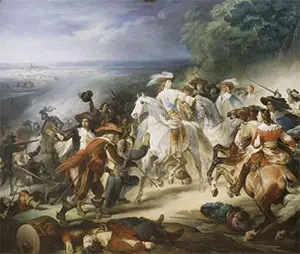The French King Louis XIII
Louis XIII was King of France in the early 17th Century. He oversaw the development of French power internationally, through wars and political intrigue, and he expanded the power of the monarchy, at the expense of French nobles. 
He was born on Sept. 27, 1601, in Fontainebleau. His father was the reigning monarch, King Henry IV, and his mother was Marie d'Medici. Louis suffered from a stammer and ill health when he was young. Henry IV had issued the Edict of Nantes in 1598, granting religious freedom to the Huguenots, a large group of French Protestants. This effectively ended a series of religious wars that had begun in 1562 and raged off and on for more than 30 years. A succession of monarchs had issued a series of edicts, none of which fully satisfied both parties. Even though the Edict of Nantes made Catholicism the state religion, many Catholics were outraged at Henry's recognition of the Huguenots' right to pursue the own religion. One such outraged Catholic killed the king, on May 14, 1610. Young Louis was just 9, yet he was the king's oldest son and so was the Dauphin, the heir to the throne, and so he became King of France. Louis's mother served as regent until the boy came of age. A primary act during this time was the young king's marriage, to Anne of Austria, whose father was King Philip III of Spain. They were married in 1615, when they both were 14. As well during this time, the Queen Mother relied heavily on a pair of trusted ministers, Galigai and Concino Concini, both of them Italian. In contrast, Louis more favored the advice of a Frenchman, Charles, Duke de Luynes, not the least because he sought for the king an expansion of royal power. Luynes managed to get rid of both Galigai and Concini, the former by trial and execution and the latter by assassination. Such was the way that politics worked in medieval times. In 1617, Louis sent his mother away from court, to Blois, so he could rule without her considerable influence. He relied instead on the counsel of his ministers. That was primarily Luynes until his death in 1621. From 1624, the king's chief minister was Cardinal Richelieu. Louis had to contend with an armed rebellion led by his mother twice, in 1619 and 1620; in both cases, the royal force was triumphant. Mother and son reconciled in 1621, and Marie joined the king's council the following year. The Wars of Religion flared up again in the late 1620s. Louis led his troops to victory over a Huguenot force in 1622; another truce stopped the fighting for a time. Royal forces won again at La Rochelle in 1628. 
Another major conflict occurring at this time was the Thirty Years War, which began in 1618. Richelieu goaded Louis into leading an army into Italy, but that strategy backfired because it alienated the Austrians, who were nominally France's allies in the Catholics-versus-Protestants war. The Queen Mother implored her son to dismiss Richelieu, fearing his influence, but the king exiled his mother instead. France declared war on Spain in May 1635. Spain got the upper hand in that conflict and looked ready to seize Paris; an inspired counterattack by Louis himself drove the Spanish invaders away. Their first four children were stillborn. King and queen finally had a son, Louis, in 1638. They had another son, Philippe, two years after that. 
A musician and patron of the arts, Louis commission well-known artists to create decorations for the Louvre. The king also established the Académie Française, dedicated to the advancement of the French language. Elsewhere in the world, Louis encouraged the development of New France, in North America, and established relations with Japan and Morocco. After a long and faithful service to the crown, first advising Marie d'Medici and then Louis XIII, Cardinal de Richelieu died, in December 1642. Louis XIII battled ill health for most of his life. He died of tuberculosis on May 14, 1643. His oldest son succeeded him as King Louis XIV. |
|
Social Studies for Kids
copyright 2002–2024
David White




